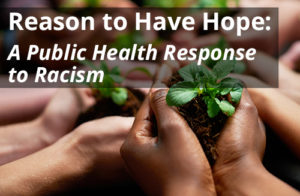CHHSM/COREM Resolution Opens UCC General Synod with Powerful Statement on Racism as a Public Health Crisis

A highlight of the July 11 opening plenary session of the United Church of Christ’s Thirty-Third General Synod — taking place virtually through July 18 — was the presentation, discussion and vote on a powerful resolution aimed at examining societal systemic racism through the lens of public health. Delegates overwhelmingly approved “A Resolution to Declare and Respond to Racism as a Public Health Crisis,” with 96 percent of delegates affirming the Resolution of Witness.
Submitted by the UCC Council for Health and Human Service Ministries (CHHSM) and Council on Racial and Ethnic Ministries (COREM), the resolution was brought to delegates as a way for the UCC and its members to declare clearly the UCC’s commitment to becoming an Anti-Racist denomination, as well as to give all settings of the church a strong, faith-based approach to continue the work of transforming society. It was introduced by the Rev. Dr. Elyse Berry, CHHSM’s associate for advocacy and leadership development, and Zillah Jackson Wesley, moderator of the COREM.
The resolution, said Berry, was framed not only in the tradition of the UCC’s long record of advocacy for health care as a right and priority for all people, but “in the context of a global pandemic, a social uprising against state-sanctioned violence, and long-standing systemic oppression against People of African Descent, Indigenous Peoples, and other People of Color.”
Wesley illustrated this by delineating some of the social determinants of health that have caused the disproportionate impact of COVID-19 on Communities of Color, including education, housing, employment, access to health care, policing, and more. “In recommending this resolution, we seek a clear commitment from all represented here to more deeply understand, advocate, and work for racial health equity, and to do so without delay,” she said.

Prior to the vote, several UCC delegates spoke in support of the resolution. Andrew Roblyer, UCC South Central Conference delegate from Friends Congregational UCC in College Station, Texas, pointed to the importance of the resolution because of the “desire of parts of society … to ignore and brush under the rug the incredible harm” created by current unjust, racist systems. “I do not think it is possible for the UCC to ignore this topic anymore,” he said.
The Rev. Dr. Marvin L. Morgan, associate delegate, related a story of spending the past several summers with his grandson. “We thought we had achieved something when, in the UCC, we addressed racial issues,” he said. “Now, my grandson and great-grandchildren will have to fight these battles all over again unless we keep this issue at the forefront of this denomination and the forefront of society.”
The approved resolution calls upon the settings of the UCC to
- Raise the church’s consciousness of racism as a public health crisis from theological, bioethical, and public health perspectives.
- Monitor and advocate for public policies that work towards health equity by addressing social determinants of health and divest in those that cause harm, violence, and death.
- Discover ways in which current ministries and mission connect with and can address racism as a public health crisis and explore new ways of incorporating this lens into the life of the church.
- Examine, in radical honesty, past and current organizational policies and practices in how they contribute or create barriers to health equity and racial justice.
- Identify current and potential relationships with members of CHHSM, COREM, other health and human service organizations, advocacy groups, faith and community-based organizations, and academic institutions to collaborate on responding to racism as a public health crisis.
But perhaps most significantly, the resolution calls upon the U.S. Congress and state legislatures to pass legislation to address the social determinants of health, including The Anti-Racism in Public Health Act, which would create a “Center on Anti-Racism in Health” at the Centers for Disease Control and Prevention (CDC), and to establish a “Law Enforcement Violence Prevention Program” at the CDC.
The Rev. Brigit Stevens, executive conference minister of the UCC’s Iowa, Nebraska, and South Dakota Conferences, spoke about the resolution’s grounding in faith. “Sometimes the idea of [racism] feels really big and overwhelming,” she said. “What I appreciate about this resolution is how the resolution is rooted in our faith: getting the idea of being anti-racist into an actional place — and caring deeply about the health and well-being of the planet.”

In addressing delegates, CHHSM President and CEO Michael J. Readinger explained, “This is not a resolution of words, but a resolution of action.” He cited CHHSM’s “Reason to Have Hope: A Public Health Response to Racism,” a new curriculum CHHSM published at the end of June in conjunction with the resolution.
This “free online course will help you in your work in your conference, association, life, and local church,” Readinger said.
Berry concurred. “I’m hoping that the delegate’s approval of this resolution will propel next steps to take shape, and I use that process language intentionally,” she said. “Some people may already be highly engaged in this crisis and so this resolution and the resources available for it may simply add more gusto to their work. Others may need a deeper discernment process that does not push for quick answers and examines with radical honesty where they are — and with whom they are in relationship.”
Berry also gave two practical ways UCC members and settings can take action immediately, one from CHHSM and one from the UCC’s Justice and Witness Ministries office.
“Register for CHHSM’s Reason to Have Hope course, which provides education as well as discernment tools for your next steps,” she said, “and respond to the action alert from Justice and Witness Ministries urging Congress to support the Anti-Racism in Public Health Act.”
Speaking after the vote, Berry said, “I’m overjoyed by the overwhelming support this resolution received. We have a lot of work to do, but when we know that this work is shared, that we’re in it together, and come to it from a place of belonging, all things are possible.”
Or, as the resolution itself states, “There is reason to have hope; where although the magnitude and overwhelming reality of racism can evoke a sense of powerlessness, addressing social determinants of health is a practical way to move forward toward together on the path to justice. The church, in all of its expressions, can be a vessel for that hope to come alive.”
Read the text of the resolution.
Learn more about the Reason to Have Hope free curriculum and sign up.
Learn more about CHHSM’s public health advocacy efforts.
Visit CHHSM’s Advocacy Center and Anti-Racism Center.
Join Our Mailing LIst
Follow on Facebook
Iredell Adult Day Services Hosts Ribbon-Cutting to Celebrate Adult Day Health Certification - CHHSM
www.chhsm.org
Iredell Adult Day Services (IADS) in Newton, N.C. — a nonprofit organization dedicated to caring for older adults, vulnerable groups, and their families, and part of EveryAge — hosted a ribbon cut...